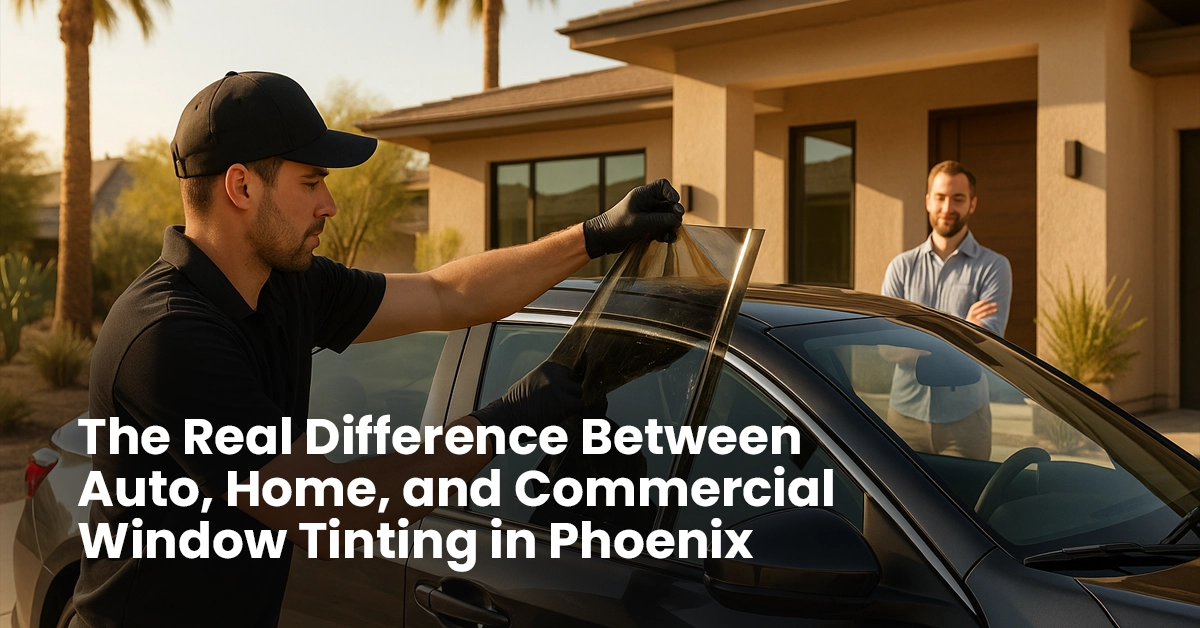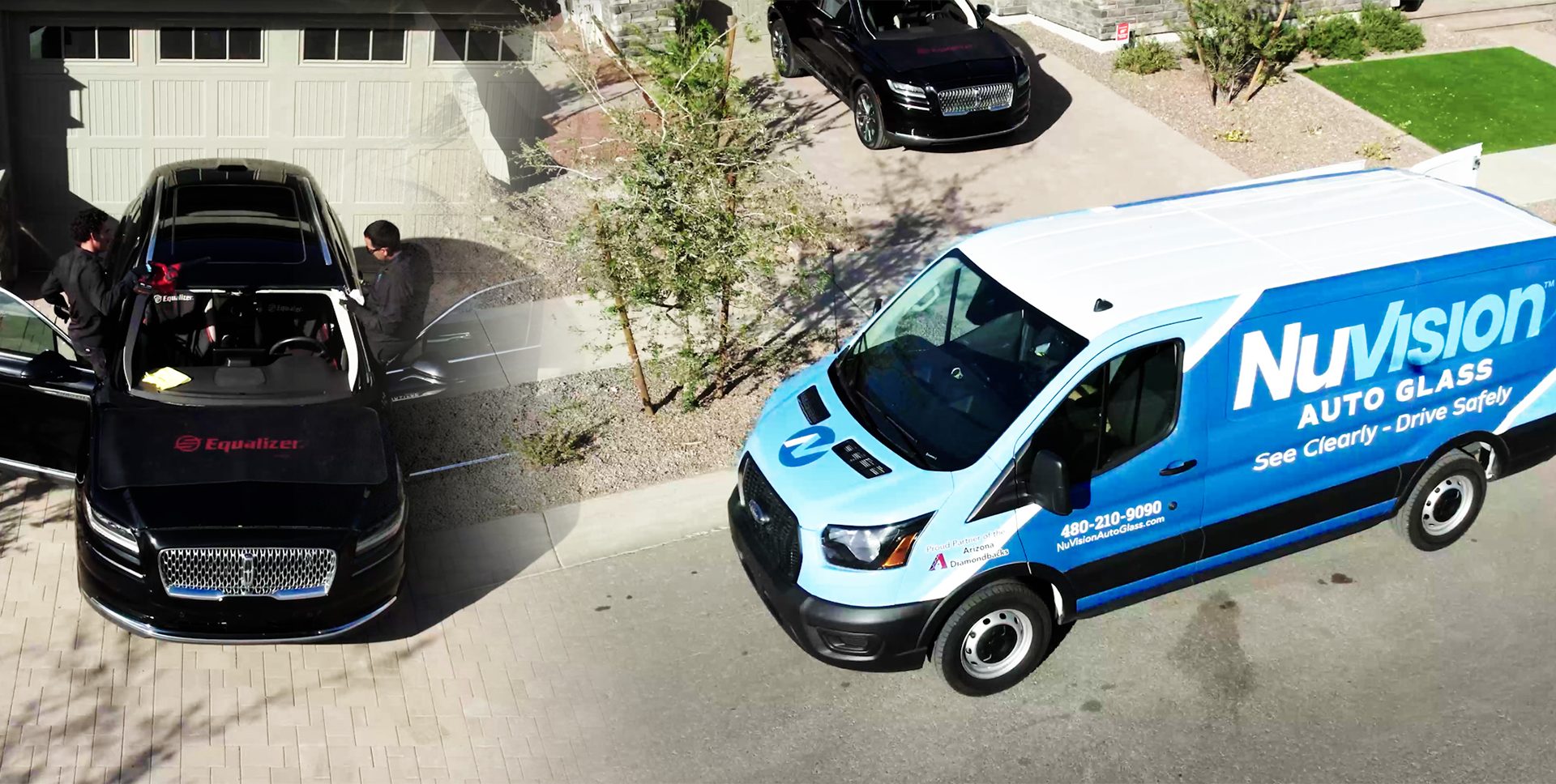The Real Difference Between Auto, Home, and Commercial Window Tinting in Phoenix

Living in Phoenix means the sun is a constant companion. While its warmth is welcome, the intense heat and relentless UV rays can damage your property and strain your air conditioning. Window tinting is a popular solution, but a critical misunderstanding often arises: the belief that all window films are created equal. They are not.
Using the wrong type of tint isn’t just ineffective; it can be illegal and unsafe. As Arizona’s trusted experts in automotive glass, we want to clarify the essential differences between auto, home, and commercial window tinting to help you make an informed and safe choice for your vehicle. While NuVision Auto Glass specializes exclusively in vehicles, understanding these distinctions is crucial for every Phoenix resident.
For a deeper dive into state regulations, check out our guide on Arizona window tint laws.
Automotive Window Tint: Built for the Road in Phoenix, AZ
Automotive window tint is a highly specialized product engineered to perform under conditions that residential and commercial films never face. It’s designed for durability, safety, and legal compliance on the unique, curved glass of a vehicle.
Expert Take:
“Our lead technician in Phoenix often explains to customers, ‘Using residential film on your car’s curved glass is a recipe for failure. It will bubble, peel, and won’t conform properly. Automotive-grade film is specifically designed with advanced adhesives and heat-shrinking capabilities to bond perfectly to your vehicle’s windows.'”
Key Characteristics of Auto Tint:
- Material and Construction: Auto films are typically made from polyester-based laminates that include dyes, metals, or ceramic particles. Ceramic tint, for example, is highly popular in Phoenix because it blocks a significant amount of infrared heat without interfering with electronic signals (GPS, satellite radio, key fobs).
- Heat Shrinking and Installation: A car’s windows are curved. Professional installers use a heat gun to shrink the tint, creating a seamless fit. This process is unique to automotive applications and requires specialized skill. Home and commercial films are designed for flat glass and cannot be heat-shrunk.
- Adhesive Systems: The adhesive on auto tint is more robust to withstand constant vibrations, frequent rolling of windows, and extreme temperature swings, from a scorching 150°F inside a parked car to a cooler evening during monsoon season.
- Legal Compliance: Arizona has strict laws governing Visible Light Transmission (VLT). According to Arizona Revised Statutes §28-959.01, front side windows must allow more than 33% of light in. Rear and back-side windows can be darker. Automotive films are manufactured to meet these specific legal VLT percentages.
For drivers of modern vehicles, it’s also important to consider how tint impacts your car’s safety features. Our technicians are experts in ADAS calibration services in Phoenix, ensuring your vehicle’s cameras and sensors function correctly after any glass service.
Residential Window Tinting: Protecting Your Phoenix Home
Residential window film is designed with one primary goal: to make your living space more comfortable and energy-efficient. Since it is applied to the flat, stationary glass of a home, its construction and features are vastly different from auto tint.
Key Characteristics of Home Tint:
- Primary Purpose: The main goals are blocking UV rays to prevent furniture fading, rejecting solar heat to lower cooling costs, and reducing glare. Security films, which are much thicker, also help prevent break-ins by holding shattered glass together.
- Higher Reflectivity: Many residential films have a high exterior reflectivity (a mirror-like appearance) to bounce solar energy away. This is highly effective for homes but is illegal on vehicles in Arizona because it can blind other drivers.
- Installation: It is applied to flat glass, so there is no need for heat shrinking. The installation process is simpler, and the adhesive is formulated for a static, long-term bond to architectural glass.
- Durability: While durable, home tint is not exposed to the harsh vibrations, frequent motion, or road debris that auto glass endures.
Commercial Window Tinting: A Multi-Purpose Solution
Commercial window tinting blends the benefits of residential film with additional features tailored for businesses, schools, and public buildings in Phoenix.
Key Characteristics of Commercial Tint:
- Enhanced Safety and Security: Commercial films are often thicker and stronger than residential tints. They are designed to withstand impact, deter smash-and-grab robberies, and minimize injury from flying glass during accidents or natural disasters.
- Anti-Graffiti Properties: Many businesses in high-traffic areas use sacrificial anti-graffiti films. These can be easily peeled off and replaced if vandalized, protecting the expensive glass underneath.
- Decorative and Privacy Options: Commercial films come in a wide variety of finishes, including frosted, opaque, and branded designs, offering privacy and aesthetic appeal for offices and storefronts.
- Energy Efficiency: Just like residential tint, a major benefit is reducing heat gain, leading to significant savings on air conditioning costs for large commercial buildings, a must in Phoenix.
Comparison: Auto vs. Home vs. Commercial Tint
| Feature | Automotive Window Tint | Residential Window Tint | Commercial Window Tint |
|---|---|---|---|
| Primary Use | Vehicle windows | Home windows & doors | Business, office, public buildings |
| Glass Shape | Curved | Flat | Flat |
| Installation | Requires heat-shrinking | No heat-shrinking | No heat-shrinking |
| Reflectivity | Low (legally restricted) | Often high | Varies, can be high |
| Adhesive | Strong, withstands vibration | Formulated for static glass | Strong, often for security |
| Key Benefit | Heat/UV rejection, safety, legal | Energy savings, UV protection | Security, anti-graffiti, energy savings |
| Phoenix Law | Strictly regulated by VLT% | Unregulated | Unregulated |
Why You Should Never Use Home or Commercial Tint on a Vehicle
- It’s Unsafe: Residential film is not designed to shatter in the same way as automotive safety glass and tint. In an accident, it may not hold the glass together correctly.
- It’s Illegal: The high reflectivity of many architectural films is illegal under Arizona law and poses a serious danger to other drivers.
- It Won’t Last: The film will quickly bubble, peel, and discolor due to the curves, vibrations, and temperature changes it’s not designed to handle.
- It Can Damage Your Windows: Using the wrong film or attempting a DIY installation can damage your window defrosters and potentially the glass itself.
When it comes to your vehicle, whether it’s a Ford F-150 or a Tesla Model Y, always trust a professional who uses high-quality, vehicle-specific materials.
Your Trusted Partner for Automotive Glass Needs in Phoenix
While the world of window tinting is broad, your vehicle requires a specialized approach. At NuVision Auto Glass, our expertise is dedicated solely to automotive glass services. From professional tint application that meets Arizona laws to flawless mobile windshield replacement in Phoenix, AZ, our certified technicians are equipped with the right tools and materials to do the job safely and correctly.
FAQs on Auto, Home, and Commercial Window Tinting in Phoenix
Can I use a darker tint on my SUV in Arizona?
Yes. In Arizona, the regulations for SUVs and trucks are different from sedans. The front side windows must still meet the 33%+ VLT requirement, but the rear side and back windows can be any darkness.
Will window tint affect my car’s GPS or cell phone signal?
It can if you choose a metallic-based film. That’s why high-quality ceramic tints are highly recommended. They offer superior heat rejection without using metal particles, ensuring no interference with your electronic devices.
Does car insurance cover window tint?
If your tinted window is damaged and needs replacement, most comprehensive insurance policies will cover the cost of replacing the glass and reapplying a tint of similar quality. We can help you navigate the details when you file an auto glass insurance claim.
How long does it take to install auto window tint?
A professional installation on a standard vehicle typically takes between 2 to 4 hours. The film then requires a curing period of a few days, during which you should not roll down the windows.

